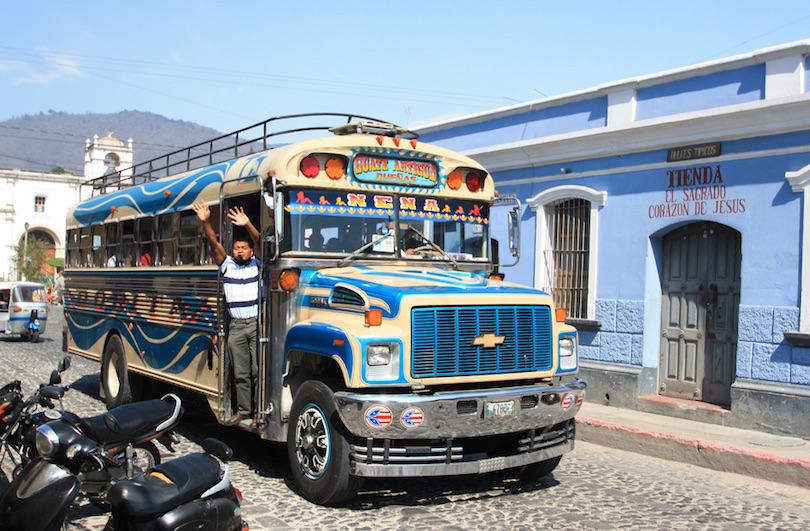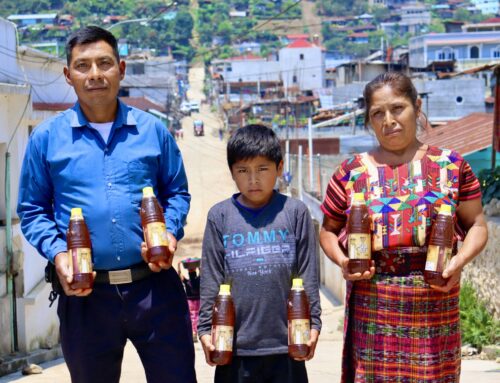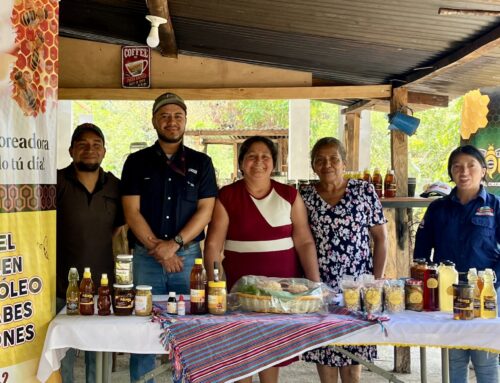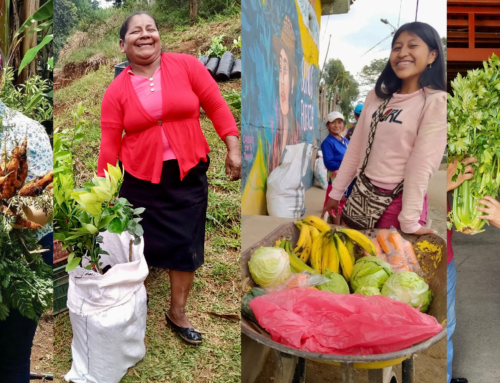Reflections on the Effects of Emigration on Rural Guatemalan Coffee Farming Communities
by Marcela Pino
Earlier this year, our Development Director Jenn Staunton and I visited two of the organizations we work with in the northwest highlands of Guatemala; the Maya Ixil cooperative in Quiche and the ACODIHUE cooperative in Huehuetenango.
Going up to the village of Santa Avelina, where most of the members of the Maya Ixil co-op live, is a 7-hour drive from Guatemala City. When we started working here, Santa Avelina was a tiny, sleepy town with a couple of shops, a church, and a park. Seven years later, the town is larger and much busier, with many shops and people going about their business.
There was also a lot of construction in nearly every town we passed on the way. When I asked about this, people said the influx of remittances from Guatemalans in other countries had increased so much in the last few years that people were investing in construction, especially during the pandemic when there was little else to do. In fact, the Banco de Guatemala reported that remittances from migrants had increased 30% from 2020 to 2022, when the total reached $1.1 million. Six million Guatemalans, or a third of the country’s population, are receiving remittances to survive in a country where 60% of the population lives in poverty, where women represent only 28% of the economy, and where access to basic public services is very limited for marginalized populations, such as rural families.
Seven years ago, few members of the Maya Ixil cooperative migrated north. After the coffee harvest, producers left their coffee plots to work in larger farms or in the big cities, but they returned as soon as possible to prepare for their coffee harvest. This is not the case anymore, and the impact of this massive migration on program participants and the communities we work with is enormous. In conversation after conversation, co-op staffers and families told us how everybody knows someone who has left. They described how emigration has made it hard for coffee producers to find people to help with the harvest and other agricultural activities, and how this has increased the price of manual labor, affecting the cost of production and the quality of the coffee. They also told us that most of the people leaving are young men (although many women have also left), and that it is a new normal for families to be separated for years, and sometimes forever.
This phenomenon feels like a cultural sea change. From the “outside,” I experience sadness to see families torn apart. Women and young men are left to manage with little experience and without the knowledge and mentorship of husbands and fathers who have headed north. I am also concerned about the loss of cultural knowledge and traditions from such a brilliant part of the world. Mayan culture is profound, and you can see this just by looking at their intricate and beautiful textiles, their cooking or the way families get together to work their farms. But I can also understand how new generations are tired of being forgotten, ignored, and left without opportunities to grow. Emigrating offers hope and possibility.
And, by the rate of construction in the countryside, there is no denying that remittances are fueling the rural economy and giving families a safety net. Some women told us that men leaving have pushed them to learn to drive cars, manage finances and produce food.
But I can’t shake the fear that emigration is disrupting the communities’ ability to build livelihood resilience and food sovereignty. It is well documented that one of the main reasons smallholder coffee farmers are vulnerable is because of their dependency on just one crop for their survival. Many families dedicate all their land to coffee production, only using a tiny portion for food production, if at all. Entire towns depend on food transported from far away, sometimes from other countries, on a weekly basis. When working with families we encourage them to see their land as their treasure. People who own land are the richest people of the world because, no matter how small their plot is, they can always optimize it by using sound agroecological practices, diversifying production, and growing at least a portion of their own food.
When COVID-19 started to spread through Latin America, many towns and villages closed their roads to all traffic. They were concerned that someone would bring the disease to a community with limited or no health services. Program participants in many communities told us that the home gardens established by our programs fed their families and many of their neighbors throughout the crisis. This is resiliency. Many of the women participating in our programs are now selling modest amounts of produce in the local markets, generating income and savings to invest in their children’s education, health care or basic food needs. Food 4 Farmers programs are strengthening local economies.
The most exciting results are the ripples that our program model makes in a community. Toward the end of our visit to Guatemala, a group of women from a village called Vista Hermosa told us how they, through our training and activities, had built enough confidence and skills to start other initiatives. They recently opened a bakery that has become so popular they are now renting a larger space to meet the growing demand.
Another example is Pablo Eli Garcia, a young beekeeper we met on the side of a hill near his apiary. His father migrated to the US, leaving Pablo in charge of the coffee plot. He and his family were struggling to make ends meet so he decided to join our beekeeping program with ACODIHUE. He started with two hives and now has more than 30 hives that he manages on his own. But the best part of Pablo’s story was that he believes participating in the bee program helped him realize he is capable of doing a lot for himself. Pablo is now a beekeeping promoter, sharing his knowledge with others.
Emigration is not only a problem for the integrity of families and culture. The absence of growers in coffee plots is already affecting coffee supply from Central America. Food 4 Farmers programs are not going to stop emigration entirely, but they offer a model to balance its impacts by training producers – especially women and young people – to engage in strategies that will give them a chance to stay on their farms, thrive on their own, and provide small but necessary economic engines in their communities.
These programs are made possible entirely through donor support. You can support programs like these here.




